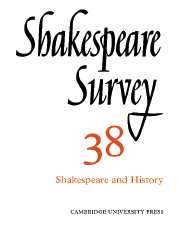Book contents
- Frontmatter
- Shakespeare’s History Plays: 1952–1983
- Shakespeare and History: Divergencies and Agreements
- Shakespeare’s Georgic Histories
- The Nature of Topicality in Love’s Labour’s Lost
- The Tragic Substructure of the Henry IV Plays
- Hal and the Regent
- The Rite of Violence in I Henry IV
- The Fortunes of Oldcastle
- Hand D in Sir Thomas More: An Essay in Misinterpretation
- Livy, Machiavelli, and Shakespeare’s Coriolanus
- Henry VIII and the Ideal England
- The Strangeness of a Dramatic Style: Rumour in Henry VIII
- ‘Edgar I Nothing Am’: Figurenposition in King Lear
- ‘Very like a whale’: Scepticism and Seeing in The Tempest
- Shakespeare’s Medical Imagination
- Shakespeare in the Theatrical Criticism of Henry Morley
- Shakespeare Performances in Stratford-upon-Avon and London 1983–4
- The Year's Contributions to Shakespearian Study 1 Critical Studies
- 2 Shakespeare’s Life, Times and Stage
- 3 Editions and Textual Studies
- Index
3 - Editions and Textual Studies
Published online by Cambridge University Press: 28 March 2007
- Frontmatter
- Shakespeare’s History Plays: 1952–1983
- Shakespeare and History: Divergencies and Agreements
- Shakespeare’s Georgic Histories
- The Nature of Topicality in Love’s Labour’s Lost
- The Tragic Substructure of the Henry IV Plays
- Hal and the Regent
- The Rite of Violence in I Henry IV
- The Fortunes of Oldcastle
- Hand D in Sir Thomas More: An Essay in Misinterpretation
- Livy, Machiavelli, and Shakespeare’s Coriolanus
- Henry VIII and the Ideal England
- The Strangeness of a Dramatic Style: Rumour in Henry VIII
- ‘Edgar I Nothing Am’: Figurenposition in King Lear
- ‘Very like a whale’: Scepticism and Seeing in The Tempest
- Shakespeare’s Medical Imagination
- Shakespeare in the Theatrical Criticism of Henry Morley
- Shakespeare Performances in Stratford-upon-Avon and London 1983–4
- The Year's Contributions to Shakespearian Study 1 Critical Studies
- 2 Shakespeare’s Life, Times and Stage
- 3 Editions and Textual Studies
- Index
Summary
Oxford-Cambridge rivalry now extends to Shakespeare publishing by the two university presses. The new Cambridge editions, like the Oxford ones, present modern-spelling texts and imitate the Arden layout, but their textual analyses are placed in appendixes and they offer reading lists of books and articles, not Oxford’s indexes to the commentaries. Sketches by C. Walter Hodges reconstruct possible Elizabethan-Jacobean stagings of selected episodes. The pages are larger, though not more readable, than those in the Oxford and Arden series. The volumes are pleasant to look at and handle.
Ann Thompson's edition of The Taming of the Shrew, appearing soon after Brian Morris's new Arden (1981) and H. J. Oliver's Oxford (1982), is a worthy competitor. On the main scholarly issues she agrees with Morris against Oliver when they differ and with both men when they do not: she believes that the Folio text was set from a transcript rather than foul papers, that A Shrew (1594) derives from Shakespeare's play, that none of the discrepancies between the sub-plots of A Shrew and The Shrew imply major revision of the latter, but that The Shrew once contained equivalents of the additional Sly episodes preserved in A Shrew.
- Type
- Chapter
- Information
- Shakespeare Survey , pp. 238 - 254Publisher: Cambridge University PressPrint publication year: 1986

